More On: Trump-Russia
Here are five Trump-Russia 'collusion' corrections we need from the media right now
House intel transcripts show top Obama officials had no 'empirical evidence' of Trump-Russia collusion
That was a difficult result to comprehend for a media establishment that had spent years promoting a Trump-Russia connection narrative while ignoring conflicting data.
Five years after the Hillary Clinton campaign-funded collection of Trump-Russia conspiracy theories known as the Steele dossier was published by BuzzFeed, news organizations who amplify the group's phony charges have lost a lot of trust. The prosecution of Igor Danchenko, the dossier's major source, for allegedly lying to the FBI has sparked a fresh crisis.
In response to what the news site Axios has called "one of the most egregious journalistic errors in modern history," the Washington Post has re-edited at least a dozen stories related to Steele. For two of those, the Post removed entire sections, changed headlines, and added lengthy editor's notes.


However, the Post's response demonstrates the media's Steele-induced self-limitations. examination's To begin with, the reporters who bylined those two pieces, Rosalind S. Helderman and Tom Hamburger, as well as their editors, have refused to explain how and why they were so blatantly mislead. They haven't even named the unnamed sources who have been fooling them and the public for months and years.
Perhaps more importantly, the Post, like other newspapers, has confined its Russiagate accounting to work directly involving Steele — and only after a criminal indictment compelled it to do so. However, the Steele dossier has been widely rejected because Special Counsel Robert S. Mueller and his team of prosecutors and FBI agents were unable to produce evidence to corroborate any of the dossier's accusations in April 2019.
The dossier was also only one piece of the Trump-Russia disinformation that was disseminated to the general public. Even when they weren't pursuing Steele's most heinous charges, the nation's most powerful news organizations pushed his underlying narrative of a Trump-Russia collusion and a Kremlin-tainted White House.
Along the way, several journalists were awarded the greatest honor in their industry for their shoddy reporting. While co-bylining pieces that the Post has all but repudiated, Helderman and Hamburger, along with more than a dozen other Post and New York Times colleagues, share an increasingly embarrassing honor: a Pulitzer Prize. The Pulitzer Prize committee honored the two papers in 2018 for 20 articles that it described as "deeply sourced, relentlessly reported public interest coverage that dramatically furthered the nation's understanding of Russian interference in the 2016 presidential election and its connections to the Trump campaign, the President-transition elect's team, and his eventual administration."
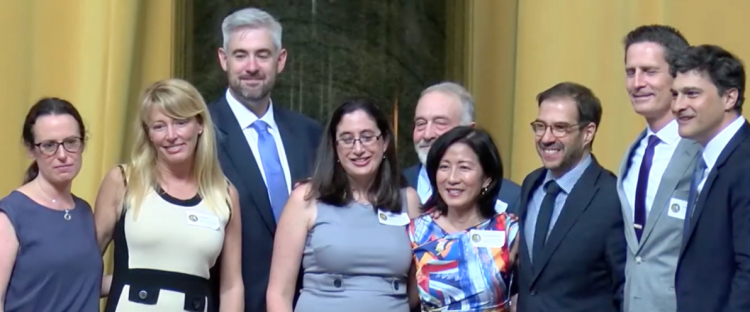
Above, Washingon Post and New York Times reporters whose 2018 Pulitzer Prize for National Reporting on the Trump-Russia affair is tainted by evidence in the public record that significant reporting was erroneous or misleading -- reporting that still has not been corrected by their publications, even though the Post recently made numerous corrections regarding the long-discredited Steele dossier. Journalist identifications are here. (Credit: YouTube/The Pulitzer Prizes)
Despite the fact that neither newspaper has indicated that it will return the Pulitzer, the public record has long shown that many of those pieces – most of which had nothing to do with Steele – include serious inaccuracies and distortions that necessitate considerable adjustments. The Post and the Times' reporting, far from demonstrating "deeply sourced, relentlessly reported coverage," has the same flaw as the Steele document, which these same outlets are now distancing themselves from: a reliance on anonymous, deceptive, and almost certainly partisan sources for claims that turned out to be false.
Many other prestigious outlets published a barrage of similarly flawed articles. These include the report by Peter Stone and Greg Gordon of McClatchy that the Mueller team obtained evidence that Trump lawyer Michael Cohen had visited Prague in 2016; Jane Mayer's fawning March 2018 profile of Steele in the New Yorker; the report by Jason Leopold and Anthony Cormier of BuzzFeed that President Trump instructed Cohen to lie to Congress -- explicitly denied by Mueller at the time; and Luke Harding of The Guardian's bizarre and evidence-free allegation that Julian Assange and Paul Manafort met in London's Ecuadorian embassy.
McClatchy and BuzzFeed have added editors' notes to their stories but have not retracted them.
In this article, RealClearInvestigations has compiled five examples of pieces that contained inaccurate or misleading assertions and were therefore needed for retraction or correction, and that were either among the Pulitzer-winning submissions of the Post and Times, or other work of reporters who shared that award. This analysis is notable in that it is based on documents and other materials that have been in the public domain for a long time. Surprisingly, some of the material that should have prompted changes has been used by the Post and Times as proof of their work.
RCI wrote comprehensive questions to the Post, the Times, and the reporters involved in these stories. The comment of the Washington Post has been included in the relevant section of this story. By the time this article was published, the Times had not responded to RCI's inquiries.
Falsehood No. 1: Michael Flynn Discussed
Sanctions With Russia and Lied About It
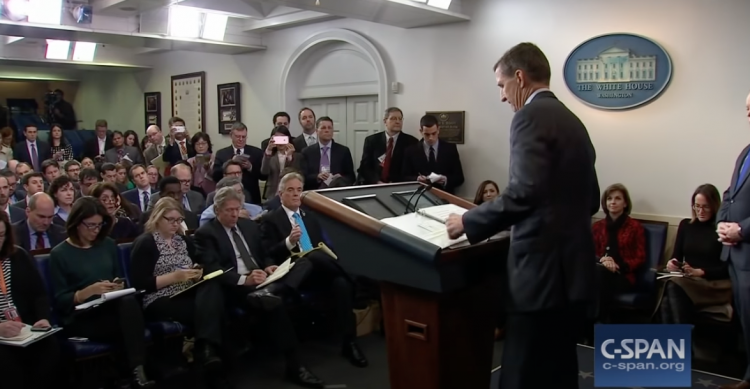
Officials say Flynn discussed sanctions
By Greg Miller, Adam Entous and Ellen Nakashima
Washington Post, February 9, 2017
The Washington Post greatly reinforced the then-growing notion that the Trump White House was tied to Russia less than a month after BuzzFeed released the Steele dossier.
National Security Adviser Michael Flynn "privately discussed US sanctions on Russia" with Russian Ambassador Sergei Kislyak, according to a Feb. 9, 2017, Washington Post report, "contrary to public assurances by Trump officials." The Washington Post got its information from nine "current and former officials" who worked in "high positions at several agencies at the time of the calls" between Flynn and Kislyak after the election on Nov. 8, 2016.
"All of those officials claimed Flynn's allusions to the election-related penalties were unambiguous," according to the Post's sources, who were releasing secret material, presumably from taps on Kislyak's phone. They also put their own perspective on the discussions' meaning: "Some senior US officials interpreted Flynn's calls with Kislyak as an inappropriate and potentially illegal signal to the Kremlin that it could expect a reprieve from sanctions imposed by the Obama administration in late December to punish Russia for its alleged interference in the 2016 election," according to the Washington Post.
A former official told the Post that Kislyak "was left with the sense that the sanctions would be reconsidered at a later time," adding some mind-reading to the story.
According to the Post and its sources, Flynn discussed a retribution for Russia's alleged 2016 election interference and then lied to cover it up.
Faced with a flood of contradictory statements from unidentified officials, Flynn backed back his early denial, telling the Washington Post that "although he had no knowledge of discussing sanctions, he couldn't be confident that the matter never came up." He was obliged to quit four days later. The following December, Special Counsel Mueller seemed to back up the Post's story when Flynn pled guilty to lying to the FBI, including about his discussions with the Russian ambassador regarding sanctions.
Flynn would later backtrack and reverse that guilty plea, sparking a multi-year legal saga. When the transcripts of his calls with Kislyak were finally released in May 2020, they showed that Flynn had grounds to fight: It wasn't Flynn who made a false statement about discussing sanctions with Kislyak; it was all nine of the Post's sources — and, later, the Mueller team — who had misled the public.
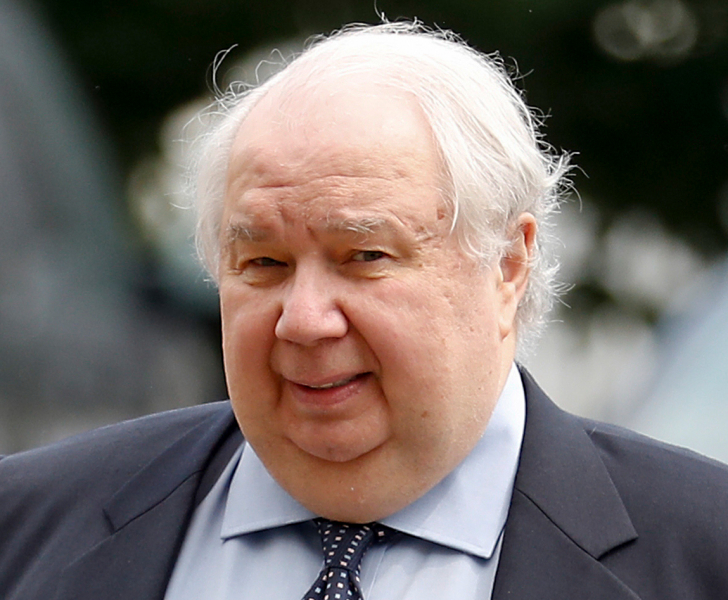
In all of Flynn's contacts with Kislyak between December 2016 and January 2017, the subject of sanctions is only mentioned once - by Kislyak. The Russian envoy expresses worry to Flynn that sanctions will stifle US-Russia collaboration in Syria in the battle against terrorist militants. "Sure, yeah," Flynn said in reaction to the situation.
The pair did have a longer discussion about a separate action Obama had ordered at the time: the expulsion of 35 Russian officials living in the United States. The expulsions, which were carried out by the State Department, were a distinct action from the sanctions, which targeted nine Russian entities and individuals under a presidential executive order.
In discussing the expulsions, Flynn never addressed what Trump might do; his only request was that the Kremlin's response be "reciprocal" and "even-keeled" so that "cool heads" can "prevail."
"[D]on't go any further than you have to," Flynn told Kislyak. "Because I don't want us to get into something that has to escalate, on a, you know, on a tit for tat."
The Mueller team mentioned these statements from Flynn in their account of the call, but incorrectly stated that they were about penalties. The Special Counsel's Office looked to be following in the footsteps of the Post's sources, who wrongly stated that Flynn's allusions to sanctions were "clear." Flynn's specific statements regarding expulsions were utilized by both the Post and the special counsel to falsely claim that he had discussed penalties.
Yet the release of the transcripts did not prompt the Post to come clean. Instead, both the Post and the New York Times doubled down on the deception. The Post's May 29, 2020, story about the transcripts' release was headlined "Transcripts of calls between Flynn, Russian diplomat show they discussed sanctions." The Times claimed that same day that "Flynn Discussed Sanctions at Length With Russian Diplomat, Transcripts Show."
In reality, the transcripts showed the exact opposite.
In response to RCI, the Post acknowledged that the Feb. 9, 2017 story had conflated "sanctions" with "expulsions."
"We appropriately used the word 'sanctions' in reference to the punitive measures announced by President Obama, including Treasury penalties on Russian individuals, expulsions of Russian diplomats/spies and the seizure of two Russia-owned properties," Shani George, the Post's Vice President for Communications, wrote.
In other articles, however -- including a Dec. 29, 2016 article linked in the Feb. 9 story's second paragraph – the Post made a clear distinction between the two. Asked about dropping the distinction between sanctions and expulsions for the article discussed here, the Post did not respond by the time of publication.
Falsehood No. 2: Repeated Contacts
With Russian Intelligence

Trump Campaign Aides Had
Repeated Contacts With Russian Intelligence
By Michael S. Schmidt, Mark Mazzetti and Matt Apuzzo
New York Times, February 14, 2017
On Feb. 14, 2017 – just one day after Flynn resigned – the New York Times fanned the flames of the growing Trump-Russia inferno.
"Phone records and intercepted calls show that members of Donald J. Trump's 2016 presidential campaign and other Trump associates had repeated contacts with senior Russian intelligence officials in the year before the election, according to four current and former American officials," the Times reported.
The story, written by three members of the paper's Pulitzer Prize-winning team, Michael S. Schmidt, Mark Mazzetti and Matt Apuzzo, also suggested that these suspicious "repeated contacts" were the basis for the FBI's investigation of the Trump campaign's potential conspiracy with Russia: "American law enforcement and intelligence agencies intercepted the communications around the same time they were discovering evidence that Russia was trying to disrupt the presidential election by hacking into the Democratic National Committee, three of the officials said. The intelligence agencies then sought to learn whether the Trump campaign was colluding with the Russians on the hacking or other efforts to influence the election."
The piece also included a pitch for Christopher Steele, who is regarded to have "a respectable track record" by senior FBI officials, according to the Times.
The narrative aided in the hiring of Special Counsel Robert Mueller, but it rapidly unraveled.
Four months after the Times' report – and just weeks after Mueller's hiring – FBI Director James Comey testified to Congress about the story, saying that "in the main, it was not true." When the Mueller report was released in April 2019, it contained no evidence of any contacts between Trump associates and Russian intelligence officials, senior or otherwise. And in July 2020, declassified documents showed that Peter Strzok, the top FBI counterintelligence agent who opened the Trump-Russia probe, had privately dismissed the article. The Times reporting, Strzok wrote upon its publication, was "misleading and inaccurate … we are unaware of ANY Trump advisers engaging in conversations with Russian intelligence officials."
To date, the Times has appended two minor corrections. The most recent one reads: "An earlier version of a photo caption with this article gave an incorrect middle initial for Paul Manafort. It is J., not D."
Rather than address its glaring errors, the Times left the story otherwise intact. When the Strzok notes disputing its claims emerged, the Times responded: "We stand by our reporting."
Earlier this year, the Times even claimed vindication. The occasion was an April 15, 2021, press release from the Treasury Department. The Treasury statement alleged that Konstantin Kilimnik, a former aide to Trump's one-time campaign manager, Paul Manafort, is a "known Russian Intelligence Services agent" who "provided the Russian Intelligence Services with sensitive information on polling and campaign strategy" during the 2016 election.
Writing that same day, Times reporters Mark Mazzetti and Michael S. Schmidt declared that Treasury's evidence-free press release — coupled with an evidence-free Senate Intelligence claim in August 2020 that Kilimnik is a "Russian intelligence officer" — now "confirm" the Times' report from February 2017.
The Treasury release did not explain how the department was driven to make an explosive claim that a multi-year FBI/Mueller inquiry found no proof for, despite the fact that it had done no formal Russiagate probe. Kilimnik's purported job in Russian intelligence is likewise unknown, as is whether or not he was a senior officer. It also ignored a plethora of contradictory evidence:
- that Kilimnik had shared this same, publicly available polling data with Americans;
- that the FBI still does not deem him a Russian intelligence officer, instead claiming that he has unspecified "ties";
- that he had long been a valued State Department source;
- that he traveled to the U.S. on a civilian Russian passport, not the suspicious diplomatic one Mueller alleged without producing it;
- and that even the Senate Intelligence Committee was "unable to obtain direct evidence of what Kilimnik did with the polling data and whether that data was shared further."
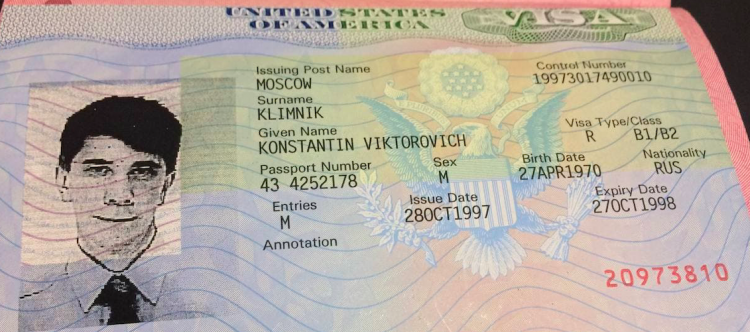
In addition, no U.S. government or congressional investigator ever contacted him for questioning, Kilimnik told RCI in an April 2021 interview when he produced images of the civilian passport.
To declare victory, Mazzetti and Schmidt not only relied on one sentence of a press release but distorted the claims of their original story. Even if Kilimnik somehow proved to be a Russian intelligence officer, the Times' 2017 story had reported that the Trump campaign had engaged in "intercepted calls" with multiple "senior Russian intelligence officials" – not just one person, and at a "senior" level.
To avoid this, Mazzetti and Schmidt used the singular Russian "intelligence officers" in the Treasury news release to claim that "there had been several interactions between the Trump campaign and Russian intelligence over the year leading up to the election." It then went back to using the plural to assert that Treasury's announcement is "the strongest proof to date" that Russian operatives had infiltrated the Trump campaign's inner workings.
RCI sent Mazzetti and Schmidt detailed questions about their February 2017 article and their claim, four years later, that a Senate report and a Treasury press release confirm it. They did not respond.
Falsehood No. 3: George Papadopoulos's
'Night of Heavy Drinking'
With the Australian Envoy
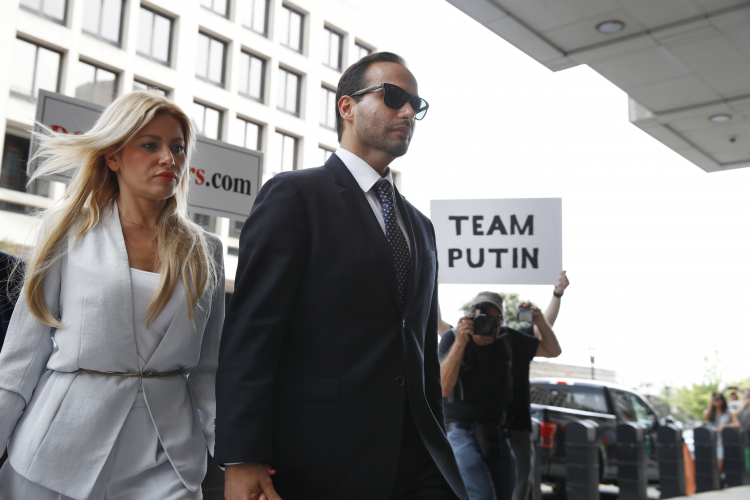
Unlikely Source Propelled Russian Meddling Inquiry
By Sharon LaFraniere, Mark Mazzetti and Matt Apuzzo
New York Times, December 30, 2017
By late 2017, the Russiagate saga was engulfing the Trump presidency. The indictments of several figures connected to Trump fueled a media-driven narrative that Mueller was closing in on a Trump-Russia conspiracy.
However, in late October, a stumbling block appeared. After a year of denials, the Hillary Clinton campaign and its law firm Perkins Coie acknowledged to funding the Steele dossier and commissioning it through a lawyer at the company, Marc Elias. House Republicans, lead by Rep. Devin Nunes, forced the disclosure after subpoenaing Fusion GPS' bank records in an attempt to uncover its hidden donor. (Perkins Coie hired Fusion GPS as an opposition research company, which then recruited Steele.)
The admission proved troublesome for those who believe in the Trump-Russia connection narrative: Steele's dossier was exposed as a paid partisan attack job by Trump's political opponents after months of anonymous media assertions that it was "credible" and even "bearing out." If the FBI was shown to have relied on the dossier, the Clinton campaign's pivotal involvement in the investigation may be called into question.
The Revised York Times published a new genesis narrative for the inquiry just before the 2017 year-end deadline for 2018 Pulitzer eligibility, hoping to allay these fears and help the newspaper win the honor. According to the Times, the FBI's decision to launch the Trump-Russia investigation had nothing to do with Steele. Instead, George Papadopoulos, a low-level campaign volunteer charged by Mueller two months previously, was the catalyst.
"During a night of heavy drinking at an upscale London bar in May 2016," the Times' piece began, Papadopoulos told an Australian diplomat named Alexander Downer that Russia had "political dirt on Hillary Clinton," including "thousands of emails." Papadopoulos, the Times said, had learned of the Russian scheme the previous month from Joseph Mifsud, a Maltese academic who claimed to be in touch with "high-level Russian officials." Mifsud's claim signaled inside knowledge of Russia's alleged hack of the Democratic National Committee, the Times said, because at that point the "information was not yet public."
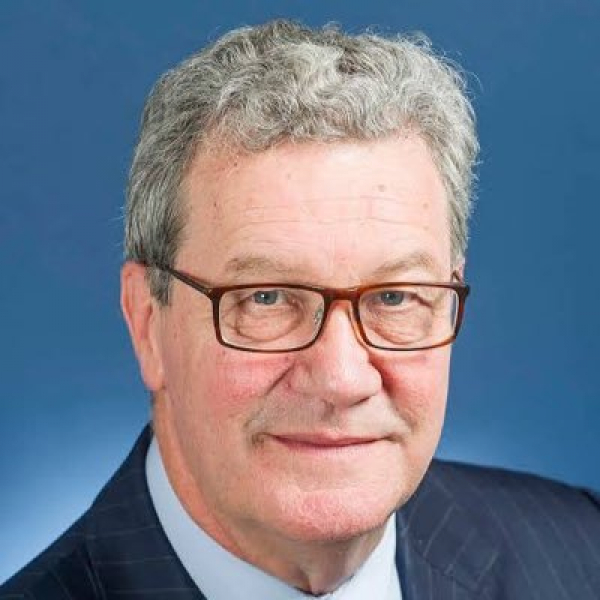
When Downer, via the Australian government, relayed this information to the U.S. in July, the FBI decided to open its Trump-Russia probe, codenamed Crossfire Hurricane, the Times reported.
"The [DNC] hacking and the revelation that a member of the Trump campaign may have had inside information about it were driving factors that led the F.B.I. to open an investigation in July 2016 into Russia's attempts to disrupt the election and whether any of President Trump's associates conspired," the Times claimed. The article pointedly asserted that the Steele dossier "was not part of the justification to start a counterintelligence inquiry, American officials said." (In a possible contradiction, it also claims, without specifics, "that the investigation was also propelled by intelligence from other friendly governments, including the British.")
Several key aspects of the article have been challenged by the principals involved — leaving aside a key question the Times appears never to have asked: Why would the FBI launch a counterintelligence probe of a presidential campaign based on a barroom conversation involving a volunteer?
Moreover, the Times or its sources mischaracterized the barroom conversation, according to both of its participants. Speaking to a Sydney-based newspaper a few months later about the fateful London exchange, Downer said Papadopoulos had never mentioned "dirt" or "thousands of emails" — which the FBI would have linked to the DNC hack. Instead, Downer told The Australian, Papadopoulos "mentioned the Russians might use material that they have on Hillary Clinton in the lead-up to the election, which may be damaging." Contrary to the specificity of the Times' rendering, Downer recalled that Papadopoulos "didn't say what it was." He also said Papadopoulos made no mention of Mifsud, a mysterious figure with rumored ties to Western intelligence who vanished after a cursory FBI interview.
A declassified FBI document would later confirm Downer's account of a vague conversation. In May 2020, the Justice Department released the July 31, 2016, FBI electronic communication (EC) that officially opened its Russia investigation. The EC states that Downer had told the U.S. government that Papadopoulos had "suggested the Trump team had received some kind of suggestion from Russia that it could assist" the Trump campaign by anonymously releasing damaging information about Clinton and President Obama. The EC made no mention of any "dirt," "thousands of emails," or Mifsud. It also acknowledged that the nature of the "suggestion" was "unclear" and that the possible Russian help could entail "material acquired publicly," as opposed to hacked emails by the thousands.
Another declassified document, the December 2017 testimony from Andrew McCabe — the former FBI deputy director who helped launch and oversee the Russia probe — also undermined the Times' premise. Asked why the FBI never sought a surveillance warrant on the Trump volunteer who supposedly sparked the investigation, McCabe replied that "Papadopoulos' comment didn't particularly indicate that he was the person … that was interacting with the Russians."
Despite the countervailing claims of Downer, McCabe, and the FBI document that opened the investigation (not to mention the recollections of both Papadopoulos and Downer that they only had one drink, belying the Times claim of "a night of heavy drinking"), the Times has never run a single update or correction.
Falsehood No. 4: Russia Launched
a Sweeping Interference Campaign
That Posed a ‘National Security Threat'
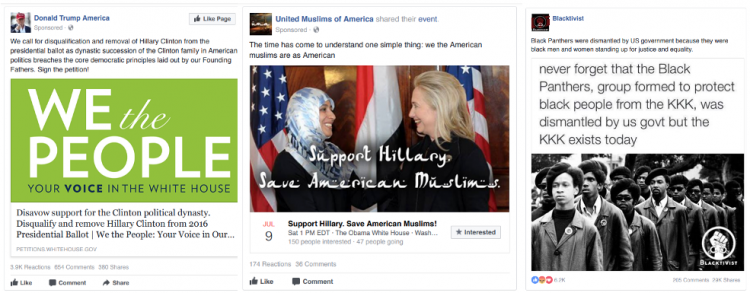
Doubting the intelligence, Trump pursues Putin
and leaves a Russian threat unchecked
By Greg Miller, Greg Jaffe and Philip Rucker
Washington Post, December 14, 2017
To Sway Vote, Russia Used Army of Fake Americans
By Scott Shane
New York Times, September 8, 2017
As the Pulitzer-winning media outlets relied on anonymous intelligence officials to fuel innuendo about Trump-Russia collusion, they turned to these same sources to imply that a compromised president was unwilling to confront the existential threat of "Russian interference."
"Nearly a year into his presidency," a Pulitzer-winning December 2017 Washington Post story declared, "Trump continues to reject the evidence that Russia waged an assault on a pillar of American democracy and supported his run for the White House." As a result, Trump has "impaired the government's response to a national security threat."
The Post's article was sourced to "more than 50 current and former U.S. officials" including former CIA Director Michael Hayden, who "described the Russian interference as the political equivalent of the Sept. 11, 2001, attacks."
Another Pulitzer-winning story, written by Scott Shane of the New York Times two months earlier, offered a revealing window into the merits of the Russian interference allegations, and the appropriateness of equating them to attacks like 9/11.
"To Sway Vote, Russia Used Army of Fake Americans," the Times' headline blared. Aside from the Pulitzer board, Shane's article also impressed the New York Times' editors, who proclaimed in a follow-up editorial that their colleague's "startling investigation" had revealed "further evidence of what amounted to unprecedented foreign invasion of American democracy."
But from the details in Shane's article, it is difficult to see why anonymous U.S. intelligence officials, Pulitzer judges, and Times editors saw the alleged Russian "cyberarmy" as such a seismic danger.
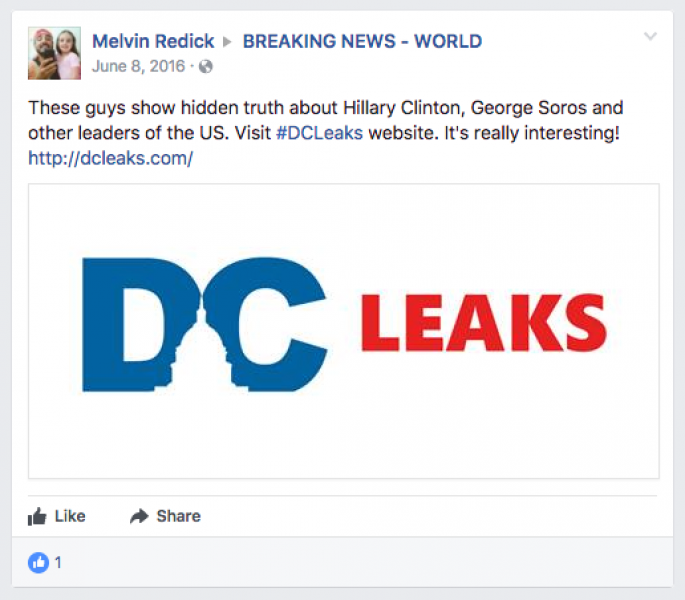
Shane's piece opened by describing a June 2016 Facebook post by an account user named Melvin Redick, who promoted the website DC Leaks, alleged by the U.S. to be a Russian intelligence cutout. Redick's posts, Shane writes, were "among the first public signs" of Russia's "cyberarmy of counterfeit Facebook and Twitter accounts" that turned the platforms into "engines of deception and propaganda." To Clint Watts, a former FBI agent turned MSNBC commentator, Russia's infiltration of Facebook and Twitter was so dangerous that social media, he said, is now afflicted by a "bot cancer."
But these explosive conclusions, Shane's own piece later acknowledged, were undermined by a lack of evidence. The online users who manipulated social media, Shane quietly notes near the bottom, were in fact only "suspected Russian operators" [emphasis added]. Shane's uncertainty extends to Melvin Redick, the alleged Russian bot who begins the story. Redick is one of several identified accounts that "appeared to be Russian creations," Shane concedes. The only proof tying Redick to Russia? "His posts were never personal, just news articles reflecting a pro-Russian worldview."
Robert Mueller's final report two years later also tried to raise alarm about what he called a "sweeping and systematic" Russian interference campaign. But as with the Pulitzer-winning outlets before him, the contents of his report failed to support the headline assertion. The Russian troll farm blamed for a sweeping social media campaign to install Trump spent about $46,000 on pre-election posts that were juvenile, barely about the election, and mostly appeared during the primaries. After suggesting that the troll farm was tied to the Kremlin, the Mueller team was forced to walk back that innuendo in court, and later dropped the case altogether. The other main claim regarding Russian interference – that the GRU (Russia's foreign intelligence agency) hacked the DNC's email servers and gave the material to Wikileaks – was quietly undermined by Mueller's qualified language and key evidentiary gaps, as RCI reported in 2019.
The Russian hacking claim suffered an additional setback in May 2020, when testimony from the CEO of CrowdStrike — the Clinton-contracted firm that was the first to publicly accuse Russia of infiltrating the DNC — was declassified. Speaking to the House Intelligence Committee in December 2017, CrowdStrike's Shawn Henry disclosed that his company "did not have concrete evidence" that alleged Russian hackers had stolen any data from the servers.
Despite its once exhaustive and alarmist interest in the operations of Russia's cyber army, neither the Times nor the Post has ever reported Henry's explosive admission. This includes Pulitzer-winning Post national security reporter Ellen Nakashima, who effectively kicked off the Russiagate saga by breaking the news on CrowdStrike's Russian hacking allegation in June 2016. Other than Henry, Nakashima's main source was Michael Sussmann – the Clinton campaign attorney recently indicted for lying to the FBI.
Falsehood No. 5: The Justice Department
Pulled Its Punches on Trump
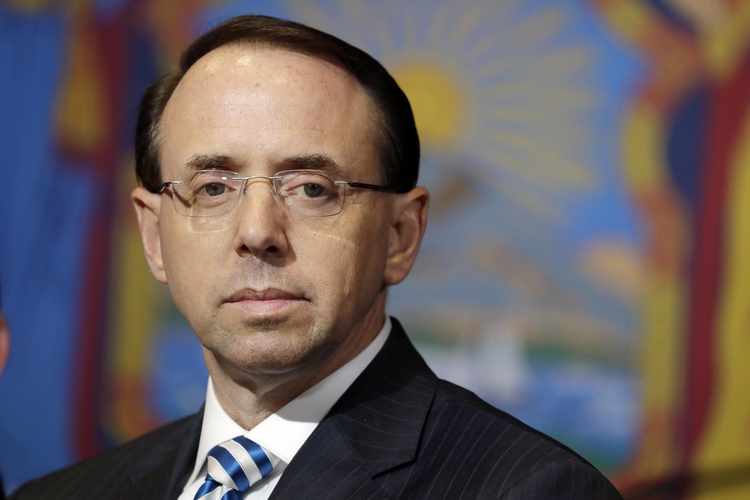
Justice Dept. Never Fully Examined
Trump's Ties to Russia, Ex-Officials Say
By Michael S. Schmidt
New York Times, Aug. 30, 2020 (Updated June 9, 2021)
When Mueller ended his investigation in 2019 without charging Trump or any other associate for conspiring with Russia, a collusion-obsessed media formulated more conspiracy theories to explain away this unwelcome ending.
First came the belief that Attorney General William Barr had forced Mueller to shut down, misrepresented his final report, and hid the smoking-gun evidence behind redactions. When Mueller failed to support any of these allegations in his July 2019 congressional testimony, a new culprit was needed.
One year later, the New York Times found its fall guy: Mueller's overseer, former Deputy Attorney General Rod Rosenstein, had handcuffed the special counsel.
"The Justice Department secretly took steps in 2017 to narrow the investigation into Russian election interference and any links to the Trump campaign, according to former law enforcement officials, keeping investigators from completing an examination of President Trump's decades-long personal and business ties to Russia," Michael Schmidt reported on Aug. 30, 2020. Rosenstein, Schmidt said, "curtailed the investigation without telling the bureau, all but ensuring it would go nowhere" and preventing the FBI from "completing an inquiry into whether the president's personal and financial links to Russia posed a national security threat."
To buttress his case, Schmidt cited the Democrats' leading collusion advocate, Rep. Adam Schiff, who feared that "that the F.B.I. Counterintelligence Division has not investigated counterintelligence risks arising from President Trump's foreign financial ties."
However, as Schmidt's piece implied, the Mueller team, not Rosenstein, was responsible for that conclusion. Schmidt said that members of Mueller's team reacted angrily to Rosenstein's appointment "Early conversations regarding a counterintelligence probe of the president were held, led by agent Peter Strzok. "However, these "efforts collapsed" when Strzok "was dismissed from the investigation three months later for exchanging text messages criticizing Mr. Trump," Schmidt wrote." Why did the special counsel workers discuss it, and why did it just "fizzle" three months after Strzok's departure, if Rosenstein had actually "curtailed" a counterintelligence probe by Mueller's team?
Strzok himself disputed the premise of Schmidt's article.
"I didn't feel such a limitation," Strzok told the Atlantic. "When I discussed this with Mueller and others, it was agreed that FBI personnel attached to the Special Counsel's Office would do the counterintelligence work, which necessarily included the president." The only problem, Strzok added, was that by "the time I left the team, we hadn't solved this problem of who and how to conduct all of the counterintelligence work." Strzok's "worry," he added, was that the counterintelligence angle "wasn't ever effectively done" – not that it was ever curtailed. Another key Mueller team member, lead prosecutor Andrew Weissmann, also rejected Schmidt's claim.
Also erroneous is NYT claim "Rosenstein concluded the F.B.I. lacked sufficient reason to conduct an investigation into the president’s links to a foreign adversary.” See DOJ Special Counsel Appointment Order, para. (b)(i). 2 of 2
— Andrew Weissmann (@AWeissmann_) August 31, 2020
Rosenstein's May 2017 scope memo, which established the parameters of Mueller's investigation, indeed contained no such limitations. It broadly tasked Mueller to examine "any links and/or co-ordination" between the Russian government and anyone associated with the Trump campaign, as well as – even more expansively – "any matters that arose or may arise directly from that investigation."
Mueller has many opportunity to demonstrate that his investigation had been hampered or curtailed during his July 2019 congressional hearing. Rep. Doug Collins (R-Ga.) asked Mueller whether "your inquiry was slowed, interrupted, or obstructed at any point during the investigation," and Mueller responded, "No." Rep. Raja Krishnamoorthi (D-Ill.) sought to get Mueller to agree that he "of course... did not seek the president's tax returns, which may otherwise reveal foreign financing sources," but Mueller refused. Mueller said, "I'm not going to speak to it."
With no restrictions or intervention in the investigation, it's possible that Mueller never discovered any Russia-related counterintelligence or financial concerns about Trump because there were none to be found.
That was a difficult result to comprehend for a media establishment that had spent years promoting a Trump-Russia connection narrative while ignoring conflicting data.
But this is not the time for excuses or false claims of vindication: the lukewarm accountability prompted by the Steele dossier's demise should just be the beginning of a far more thorough investigation. Broadly deceptive journalism that threw an American administration into disarray demands far more than patchwork repairs.
This and all other original articles created by RealClearInvestigations may be republished for free with attribution.
















